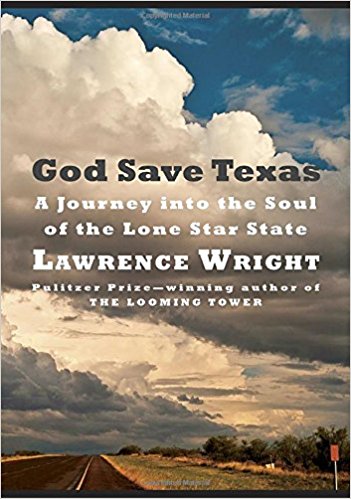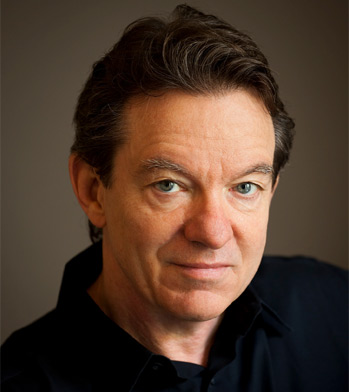To many Americans, Texas is a place wrapped in myth. The myth of frontier life and country ballads. Of barbecue and enlarged belt buckles. There’s a degree of truth to these legends, sure. But they’re also, to a large degree, folktales. If Texas were a sovereign nation, it would possess the 10th-largest economy in the world. You don’t get that kind of modern-day financial sway through spurs and belt buckles.
With his new book, God Save Texas, Pulitzer Prize winner and New Yorker journalist Lawrence Wright tries to bring Texas into the modern day, in part by exploring its complex, sometimes contradictory, past. The book asks readers to treat Texas—with all its natural disasters, political extremism, anti-regulation fervor, and general weirdness—as a place that, while in possession of a unique history and culture, is also a reflection of the country’s evolution as a whole.
Texas’ population is predicted to balloon to 54.4 million people by 2050. Currently, one in 10 American children are living in Texas. With Dallas, Houston, and San Antonio among the top 10 most populous cities in the country—and Austin’s population growth close behind—it’s important that we consider how Texas’ unique culture came to develop in the first place, and what the state’s evolution has meant for that culture.
For more insights into those issues, Pacific Standard spoke with Wright himself.

Many people claim that your well-founded criticism of Texas represents a dislike of the state. Have you actually fallen out of love with Texas?
I really quarrel with that. I don’t know where that came from because I love Texas—[otherwise] I wouldn’t be here. I love it enough to criticize it. I feel as a Texan that I have that right. But you know I cherish the state and I’m disturbed by some of the political trends in the state. But you know I’m very much involved in the culture.
God Save Texas is reported but it’s largely memoir. How was the writing process different from the non-fiction books people know you from, like The Looming Tower: Al-Qaeda and the Road to 9/11?

(Photo: Knopf)
As a young reporter I was trained not to use the first person pronoun. I try to write about other people’s lives. But in this case I understood that the voice the reader was going to have to attend to was going to be my own. And you have to think about who you are to the reader. You have to represent yourself in a candid way that the reader will come to trust.
You describe these “three levels” of Texas culture. How did you arrive at that structural explanation?
I was struck by the fact that Texas has such a profound cultural imprint on its citizens. Everybody in the world has an impression of Texas. Why is that? What is it that they think Texas is?
Basically, what sets Texas apart is what I call “Level One Culture,” the primitive materials that made the Texas culture in the first place that we still have enshrined in our society: barbecue, cowboy hats, boots, belt buckles, oil men, cattle drives. People cherish those things and keep those traditions alive.
With the arrival of oil at the turn of the 20th century, Texas began to change because money came into the state. And when money arrives something happens to a culture. “Level Two” is what I call this period: when a culture has enough money to start looking around at other cultures and other countries and other cities, trying to see what they have to offer and then importing those ideas. The museums and the libraries and the higher and higher levels of education are established; people start to travel and buy up art. There is something really wonderful about that stage of culture. But it’s also somewhat false.
It definitely flattens the culture.
That homogenization of American culture is evidence of Level Two thinking all over the country. And then there’s a third level, which is when you return to the roots of the culture, but with a new level of appreciation and forgiveness, and you incorporate those things into your work. That can be Beyonce’s Lemonade, where she’s using the country music and church music of her youth in Houston. Or it can be the architecture: The new library in Austin is a Lake Flato building.
Part of your book looks at immigration along the Texas border. What conclusions did you arrive at in the process of writing?
Because I’ve spent so much of my life studying terrorism, I do think it’s important for a state or a country to manage the people that come into it. But there are two things about [American immigration policy] that I find very disturbing. One is that people, especially political refugees, who come into the country and apply for asylum are given a court date; it can be years in advance. They simply disappear into America—and why would they not? That doesn’t make any sense at all.

Then there’s the fact that we need labor. It’s very difficult for, say, the construction industry, or landscaping or meat packing; all these industries are really threatened because they depend on that kind of immigrant labor. But it’s not just blue-collar labor that is struggling to fill those jobs. The tech industry has the same challenge.
Shutting off the flow of immigration is a real mistake. We have essentially a full employment economy right now, and we’re desperate for additional labor. We need to have a wholesale reform of our immigration process because our economy requires it. It’s just indecent to keep people in this kind of half-free, half-slave state that so many undocumented people find themselves in.
What in particular surprised you about Texas’ history while writing this book?
I never knew much about the oil industry, even growing up in Texas. it was all sort of foreign to me. One thing I came to appreciate: Whatever you think about fracking, the ingenuity of these guys was totally amazing to me.
I still get into debates on where Texas fits in our geographic understanding of the country. Is Texas Southern? Southwestern? An entity of its own?
I think it’s all of those things. Texas is where everything comes to an end. The South ends in east Texas, the Great Plains end in North Texas, the Mountain West ends in West Texas, Mexico ends in South Texas.
It’s amazing to me that Texas maintains this fierce sense of identity given all the disparities there are in the state. But we have some sort of secret sauce that causes people in Texas to believe we are all one people.
This interview has been edited for length and clarity.





